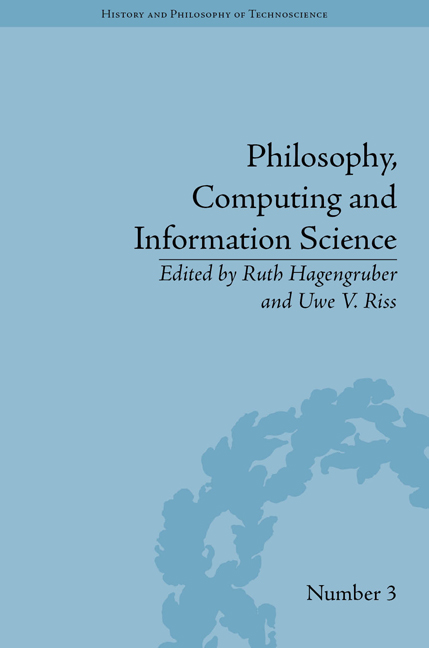Book contents
- Frontmatter
- CONTENTS
- List of Contributors
- List of Figures and Tables
- Introduction: Philosophy's Relevance in Computing and Information Science
- Part I Philosophy of Computing and Information
- Part II Complexity and System Theory
- Part III Ontology
- 7 The Relevance of Philosophical Ontology to Information and Computer Science
- 8 Ontology, its Origins and its Meaning in Information Science
- 9 Smart Questions: Steps towards an Ontology of Questions and Answers
- Part IV Knowledge Representation
- Part V Action Theory
- Part VI Info-Computationalism
- Part VII Ethics
- Notes
- Index
7 - The Relevance of Philosophical Ontology to Information and Computer Science
from Part III - Ontology
- Frontmatter
- CONTENTS
- List of Contributors
- List of Figures and Tables
- Introduction: Philosophy's Relevance in Computing and Information Science
- Part I Philosophy of Computing and Information
- Part II Complexity and System Theory
- Part III Ontology
- 7 The Relevance of Philosophical Ontology to Information and Computer Science
- 8 Ontology, its Origins and its Meaning in Information Science
- 9 Smart Questions: Steps towards an Ontology of Questions and Answers
- Part IV Knowledge Representation
- Part V Action Theory
- Part VI Info-Computationalism
- Part VII Ethics
- Notes
- Index
Summary
Historical Background
Ontology as a branch of philosophy is the science of what is, of the kinds and structures of objects, properties, events, processes and relations in every area of reality. The earliest use of the term ‘ontology’ (or ‘ontologia’) seems to have been in 1606 in the book Ogdoas Scholastica by the German Protestant scholastic Jacob Lorhard. For Lorhard, as for many subsequent philosophers, ‘ontology’ is a synonym of ‘metaphysics’ (a label meaning literally: ‘what comes after the Physics’), a term used by early students of Aristotle to refer to what Aristotle himself called ‘first philosophy’. Some philosophers use ‘ontology’ and ‘metaphysics’ to refer to two distinct, though interrelated, disciplines, the former to refer to the study of what might exist; the latter to the study of which of the various alternative possible ontologies is in fact true of reality.
The upper level of Lorhard's own ontology is illustrated in Figure 7.1.
The term – and the philosophical discipline of ontology – has enjoyed a chequered history since 1606, with a significant expansion, and consolidation, in recent decades. We shall not discuss here the successive rises and falls in philosophical acceptance of the term, but rather focus on certain phases in the history of recent philosophy which are most relevant to the consideration of its recent advance, and increased acceptance, also outside the discipline of philosophy.
Information
- Type
- Chapter
- Information
- Philosophy, Computing and Information Science , pp. 75 - 84Publisher: Pickering & ChattoFirst published in: 2014
